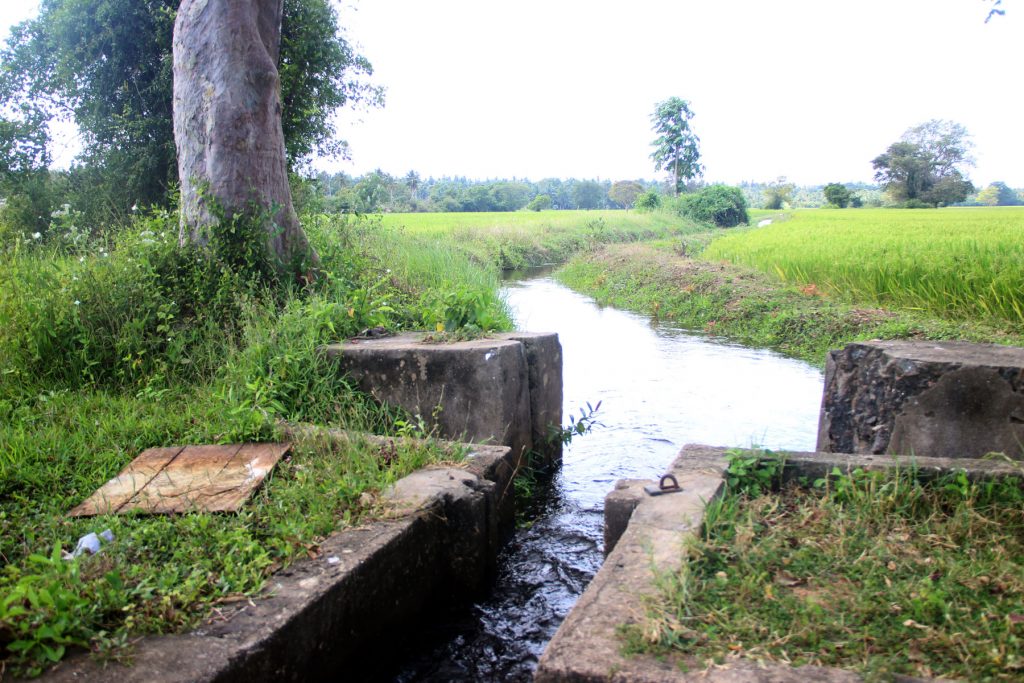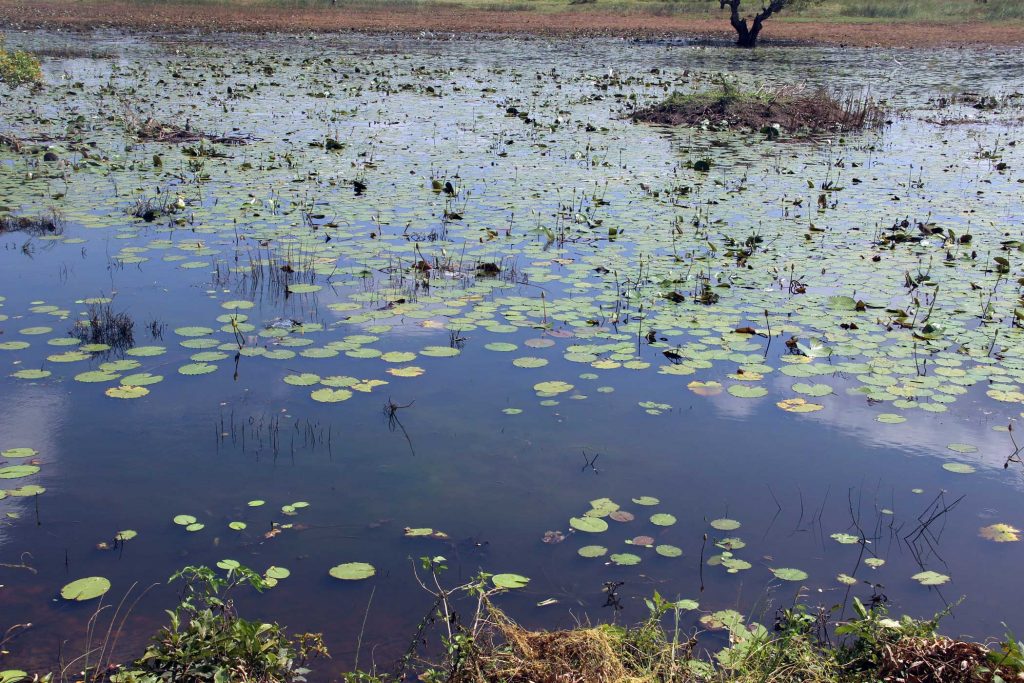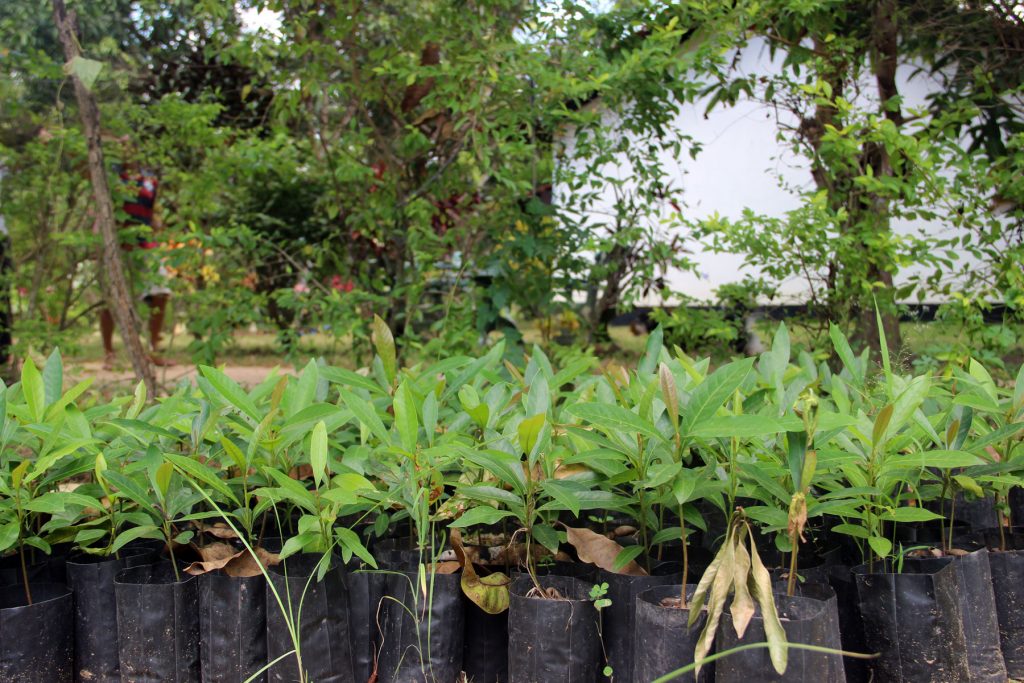Supporting farmer communities in climate change adaptation activities
By Naveendra Senarathna & Duasha Aluthgamage
People of Arachchikatuwa division in the Puttalam District are an agriculture dependant group who have endured the harsh climate of our tropical island indefinitely. With seemingly endless periods of drought and short-lived yet turbulent rainfall, the people must utilize their limited resources to the best of their ability. In situations such as this, efficient and economical methods are crucial.
During the colonial period of Sri Lanka, areas surrounding the paddy fields in this district were covered in a certain tree locally named as “Mee” trees. These specific trees were able to bear nitrogen rich fruit, which eventually fell to the ground, decayed and significantly increased the soil-nutrient content, which in turn allowed the paddy crops to grow more abundantly. However, these trees were cut down and eventually farmers in this area used fertilizer instead. Several tanks built in this area supplied water to 120 acres of paddy. Due to lack of maintenance a total of 227 tanks were neglected, and this resulted in them being covered in a dense layer of overgrowth, which notably decreased the capacity of the tank to hold water.
Farmers in this area currently use only a few remaining tanks which is not sufficient to cultivate and even these tanks are in a dilapidated condition. Between the tanks and the paddy fields, run a vast network of basic waterways which were dug into the ground to irrigate the crops. These waterways don’t supply adequate water to the cultivation as the water gets absorbed into the soil before reaching the paddy fields.
The Sri Lanka Red Cross Society (SLRCS) aimed to aid in small but effective way by lining these waterways with concrete in order to reduce soil-water absorption. So far, SLRCS has given the Pahalathanganaya area sufficient financial aid to line their waterways with concrete for 2.3km.
The tank renovation process, initiated by the SLRCS, started with various government agents – from departments such as the Agrarian department and the Irrigation department – selecting a suitable group of individuals in order to form a Farmer Organization. Two tanks within the district were then selected to be renovated. After the Farming Organization came up with a Maintenance and Operating Plan, the renovation of the tank began. This process was carried out in 4 districts: Puttalam, Anuradhapura, Kilinochchi and Mullaitivu. Each district had two Farmer Organizations renovating two respective tanks and the Ministry of Irrigation monitored each of the renovations.
“120 Acres of paddy can be cultivated in our village. Since the tank was not in a good condition, we were unable to cultivate properly. The water capacity in these tanks was not enough for cultivation due to its condition. We are thankful to Red Cross for the support given to our community to renovate this tank. Red Cross also donated various plants, agricultural equipment as well. Said the Agriculture Development Officer – In-charge of Pahalththanniya.
This was also carried out in the three other districts mentioned previously. SLRCS also built a barrier/ledge of sorts which spanned 400m across the Halambawatawana tank so that the water collected, stayed in the tank and will not be a threat to the nearby village. These renovated tanks can now collect a large body of water during the fleeting wet season and therefore will be able to sustain the surrounding paddy fields till the next rain. The Katupotha Bakmee Wewa tank was also renovated by adding a water-out, which connected the tank to a neighbouring paddy field. Along with this, multiple run-down and unused waterways will be rebuilt and connected to newly renovated tanks so that a more effective network is formed amongst the fields.
“This tank was in a dilapidated condition for many years. Therefore, we couldn’t cultivate properly. We were so happy when the Red Cross came forward to support us to reconstruct this tank once again.” Mr. Abeysekara a resident of Arachchikatuwa said.
Tree Planting Initiative
Moreover, SLRCS also planned a Mee tree replanting programme in the Puttalam district where 100 families were given 5 trees each to replant around their respective paddy fields. This programme aims to bring back the fertile soils that will allow the paddy to grow to produce a higher yield.
SLRCS has even introduced home gardening to the locals in all 4 districts. Families were trained to use methods which minimize the amount of water being used and were even taught to make organic fertilizer. All necessary equipment was distributed and awareness was spread in order to ensure the use of sustainable techniques. “Thibbattu plants (Solanum Torvum) were given to families in the villages of all four districts as this is a plant which grows well despite the scarcity of water and also has a high market value. This will in turn, be advantageous to the locals in the districts and will in the long term, improve their lives financially.




